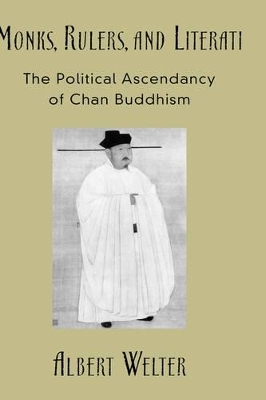
Monks, Rulers, and Literati
The Political Ascendancy of Chan Buddhism
Seiten
2006
Oxford University Press Inc (Verlag)
978-0-19-517521-9 (ISBN)
Oxford University Press Inc (Verlag)
978-0-19-517521-9 (ISBN)
Presents the story of the rise of Chan, a story which has been obscured by myths about Zen. This book concentrates on an important but neglected period of Chan history, the 10th and 11th centuries, when monks and rulers created the so-called Chan "golden age" and the classic principles of Chan identity.
The Chan (Zen in Japanese) school of Chinese Buddhism began when, in the seventh century, a small religious community gathered around a Buddhist monk named Hongren. Over the centuries, Chan Buddhism grew from an obscure movement to an officially recognized and eventually dominant form of Buddhism in China and throughout East Asia. In this book Albert Welter presents, for the first time in a comprehensive fashion in a Western work, the story of the rise of Chan, a story which has been obscured by myths about Zen. Zen apologists in the twentieth century, Welter argues, sold the world on the story of Zen as a transcendental spiritualism untainted by political and institutional involvements. In fact, Welter shows that the opposite is true: relationships between Chan monks and political rulers were crucial to Chan's success. The book concentrates on an important but neglected period of Chan history, the 10th and 11th centuries, when monks and rulers created the so-called Chan "golden age" and the classic principles of Chan identity.
The Chan (Zen in Japanese) school of Chinese Buddhism began when, in the seventh century, a small religious community gathered around a Buddhist monk named Hongren. Over the centuries, Chan Buddhism grew from an obscure movement to an officially recognized and eventually dominant form of Buddhism in China and throughout East Asia. In this book Albert Welter presents, for the first time in a comprehensive fashion in a Western work, the story of the rise of Chan, a story which has been obscured by myths about Zen. Zen apologists in the twentieth century, Welter argues, sold the world on the story of Zen as a transcendental spiritualism untainted by political and institutional involvements. In fact, Welter shows that the opposite is true: relationships between Chan monks and political rulers were crucial to Chan's success. The book concentrates on an important but neglected period of Chan history, the 10th and 11th centuries, when monks and rulers created the so-called Chan "golden age" and the classic principles of Chan identity.
Albert Welter is Professor of Asian Religions at the University of Winnipeg in Canada. He is the author of The Meaning of Myriad Good Deeds: A Study of Yung-Ming Yen-Shou and the Wan-Shan T'ung-Kuei Chi (1994).
| Erscheint lt. Verlag | 23.2.2006 |
|---|---|
| Zusatzinfo | 3 maps, 20 line drawings, tables |
| Verlagsort | New York |
| Sprache | englisch |
| Maße | 243 x 165 mm |
| Gewicht | 617 g |
| Themenwelt | Geisteswissenschaften ► Religion / Theologie ► Buddhismus |
| ISBN-10 | 0-19-517521-2 / 0195175212 |
| ISBN-13 | 978-0-19-517521-9 / 9780195175219 |
| Zustand | Neuware |
| Haben Sie eine Frage zum Produkt? |
Mehr entdecken
aus dem Bereich
aus dem Bereich
Philosophische Betrachtungen
Buch | Softcover (2024)
Aufbau TB (Verlag)
CHF 20,95
Unterweisungen in Zen-Meditation
Buch | Hardcover (2024)
Arkana (Verlag)
CHF 29,90


